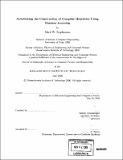| dc.contributor.advisor | Saman Amarasinghe. | en_US |
| dc.contributor.author | Stephenson, Mark William, 1975- | en_US |
| dc.contributor.other | Massachusetts Institute of Technology. Dept. of Electrical Engineering and Computer Science. | en_US |
| dc.date.accessioned | 2008-02-28T15:42:30Z | |
| dc.date.available | 2008-02-28T15:42:30Z | |
| dc.date.copyright | 2006 | en_US |
| dc.date.issued | 2006 | en_US |
| dc.identifier.uri | http://dspace.mit.edu/handle/1721.1/37902 | en_US |
| dc.identifier.uri | http://hdl.handle.net/1721.1/37902 | |
| dc.description | Thesis (Ph. D.)--Massachusetts Institute of Technology, Dept. of Electrical Engineering and Computer Science, 2006. | en_US |
| dc.description | Includes bibliographical references (p. 153-162). | en_US |
| dc.description.abstract | Compiler writers are expected to create effective and inexpensive solutions to NP-hard problems such as instruction scheduling and register allocation. To make matters worse, separate optimization phases have strong interactions and competing resource constraints. Compiler writers deal with system complexity by dividing the problem into multiple phases and devising approximate heuristics for each phase. However, to achieve satisfactory performance, developers are forced to manually tweak their heuristics with trial-and-error experimentation. In this dissertation I present meta optimization, a methodology for automatically constructing high quality compiler heuristics using machine learning techniques. This thesis describes machine-learned heuristics for three important compiler optimizations: hyperblock formation, register allocation, and loop unrolling. The machine-learned heuristics outperform (by as much as 3x in some cases) their state-of-the-art hand-crafted counterparts. By automatically collecting data and systematically analyzing them, my techniques discover subtle interactions that even experienced engineers would likely overlook. In addition to improving performance, my techniques can significantly reduce the human effort involved in compiler design. | en_US |
| dc.description.abstract | (cont.) Machine learning algorithms can design critical portions of compiler heuristics, thereby freeing the human designer to focus on compiler correctness. The progression of experiments I conduct in this thesis leads to collaborative compilation, an approach which enables ordinary users to transparently train compiler heuristics by running their applications as they normally would. The collaborative system automatically adapts itself to the applications in which a community of users is interested. | en_US |
| dc.description.statementofresponsibility | by Mark W. Stephenson. | en_US |
| dc.format.extent | 162 p. | en_US |
| dc.language.iso | eng | en_US |
| dc.publisher | Massachusetts Institute of Technology | en_US |
| dc.rights | M.I.T. theses are protected by copyright. They may be viewed from this source for any purpose, but reproduction or distribution in any format is prohibited without written permission. See provided URL for inquiries about permission. | en_US |
| dc.rights.uri | http://dspace.mit.edu/handle/1721.1/37902 | en_US |
| dc.rights.uri | http://dspace.mit.edu/handle/1721.1/7582 | |
| dc.subject | Electrical Engineering and Computer Science. | en_US |
| dc.title | Automating the construction of a complier heuristics using machine learning | en_US |
| dc.type | Thesis | en_US |
| dc.description.degree | Ph.D. | en_US |
| dc.contributor.department | Massachusetts Institute of Technology. Department of Electrical Engineering and Computer Science | |
| dc.identifier.oclc | 132792993 | en_US |
